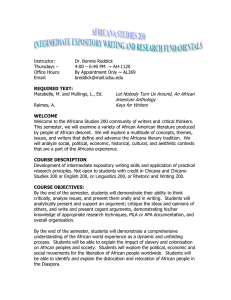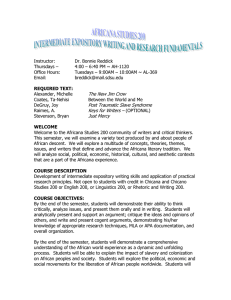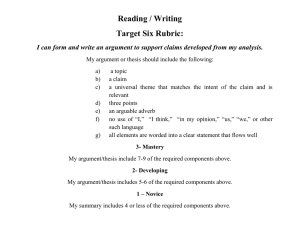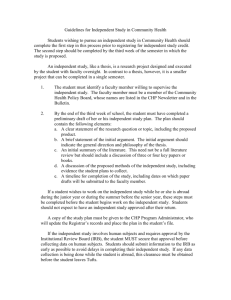Instructor: Dr. Bonnie Reddick Thursdays –
advertisement
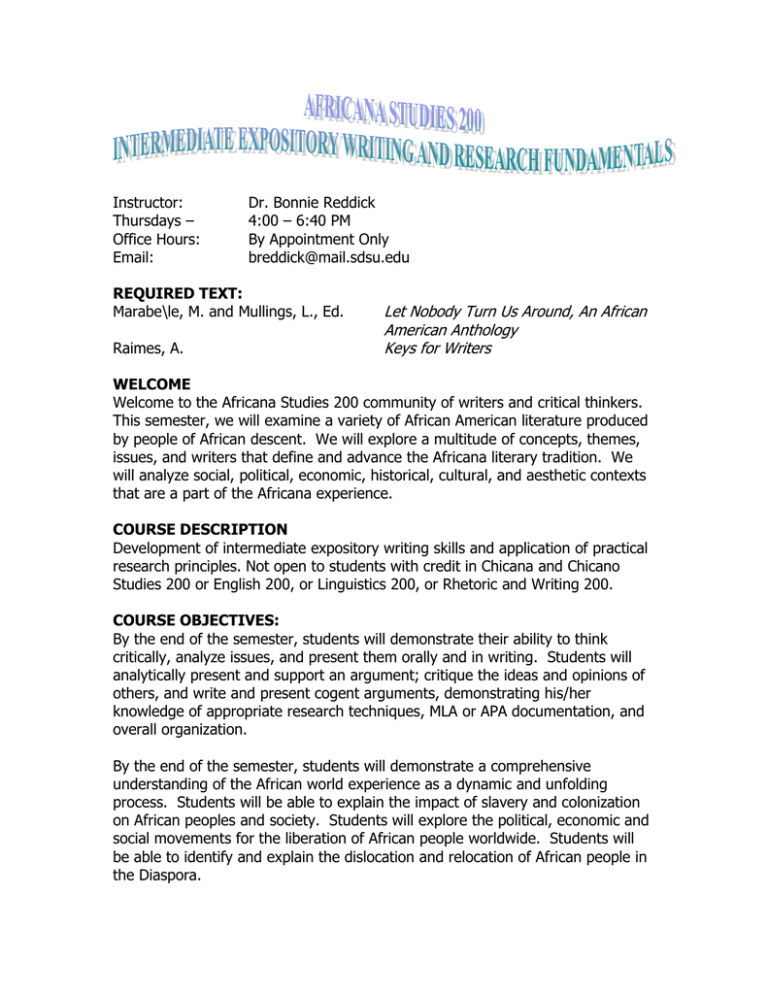
Instructor: Thursdays – Office Hours: Email: Dr. Bonnie Reddick 4:00 – 6:40 PM By Appointment Only breddick@mail.sdsu.edu REQUIRED TEXT: Marabe\le, M. and Mullings, L., Ed. Raimes, A. Let Nobody Turn Us Around, An African American Anthology Keys for Writers WELCOME Welcome to the Africana Studies 200 community of writers and critical thinkers. This semester, we will examine a variety of African American literature produced by people of African descent. We will explore a multitude of concepts, themes, issues, and writers that define and advance the Africana literary tradition. We will analyze social, political, economic, historical, cultural, and aesthetic contexts that are a part of the Africana experience. COURSE DESCRIPTION Development of intermediate expository writing skills and application of practical research principles. Not open to students with credit in Chicana and Chicano Studies 200 or English 200, or Linguistics 200, or Rhetoric and Writing 200. COURSE OBJECTIVES: By the end of the semester, students will demonstrate their ability to think critically, analyze issues, and present them orally and in writing. Students will analytically present and support an argument; critique the ideas and opinions of others, and write and present cogent arguments, demonstrating his/her knowledge of appropriate research techniques, MLA or APA documentation, and overall organization. By the end of the semester, students will demonstrate a comprehensive understanding of the African world experience as a dynamic and unfolding process. Students will be able to explain the impact of slavery and colonization on African peoples and society. Students will explore the political, economic and social movements for the liberation of African people worldwide. Students will be able to identify and explain the dislocation and relocation of African people in the Diaspora. By the end of the semester, students will demonstrate their ability to describe and apply basic steps in completing a research paper; evaluate source materials critically; and incorporate scholarly analysis in concert with the source materials. GRADING: Library Scavenger Hunt Class Intellectual Work Research Proposal & Bibliography Observations Research Paper Final TOTAL POINTS 10% 20% 10% 15% 30% 15% 100% A (95-100); A- (90-94); B+ (86-89); B (83-85); B- (80-82); C+ (76-79); C (73-75); C- (70-72); D+ (66-69); D (63-65); D- (60-62); F (0-59) READING Reading is an important part of developing strong writing and critical thinking skills. Completion of all readings will be necessary for quizzes, homework, essays, exams, and class discussions. WRITING In addition to quizzes and writing assignments, two (2) short essays will be required. Additional information will be given as the semester progresses. Students agree that by taking this course all required papers will be subject to submission for textual similarity review to Turnitin.com for the detection of plagiarism. All submitted papers will be included as source documents in the Turnitin.com reference database solely for the purpose of detecting plagiarism of such papers. You may submit your papers in such a way that no identifying information about you is included. Another option is that you may request, in writing, that your papers not be submitted to Turnitin.com. However, if you choose this option you will be required to provide documentation to substantiate that the papers are your original work and do not include any plagiarized material. You will learn two methodological approaches to research this semester: autoethnography and a literature review. All class discussions and exercises are designed to familiarize you with both approaches and to give you practical experience in the autoethnographic process. LIBRARY SCAVENGER HUNT Each student must complete the Library Scavenger Hunt. This exercise is designed to familiarize each student with specific African American resources. available in the Library, along with additional library services. This exercise must be completed on the date detailed on the Course Calendar. If you are absent, you CANNOT make uo this assignment. CLASS INTELLECTUAL WORK The class intellectual work template is a part of this syllabus. You are required to make a copy of the form for each class. Before leaving class each week, complete the form and hand it in. Take the opportunity to complete this form while you are taking notes and participating in class. Your intellectual work at SDSU generally, and this course specifically, is to 1. Be Present; 2. Read and Write (listen and inscribe); and 3. Speak. The form evaluates the topic of the day. It also provides an assessment of the professor’s contribution and the student’s individual contribution. In addition, it gives the student an opportunity to opine on what the professor can do to make the learning process more meaningful for him or her. AUTOETHNOGRAPHY Autoethnography is an academic process by which a scholar positions him or herself in the center of the research and analysis and transparently uses his or her life experiences to interpret the data. In addition, autoethnography invites alternative mediums for reporting the data, such as storytelling, poetry, pictures, and performance. OBSERVATION Each student will conduct three observations and write up the findings: Interview classmate Each student will interview one of his/her classmates. Each student will take copious notes of what his/her partner says and about the surroundings. The student will write up his/her findings. Your findings are limited to one typed page. Each student will share his/her findings and your cohorts will critique you. Your findings should be submitted as a Journal in Blackboard by 4:00 PM on the due date. Black beauty or barber shop Each student must visit either a black beauty or barbershop. You must call the owner and get permission to do your observation. You will sit at the shop for at least one hour. You will only observe, take notes, and you must take a picture (please get permission first), submit it with your findings. Do not engage in conversation with the operators or the customers. Write up your findings. It cannot exceed one typed page. You will share your findings, and your cohorts will critique you. Your findings should be submitted as a Journal in Blackboard by 4:00 Pm on the due date. African Museum visit Each student must visit the African Museum, Casa Del Moro. It is located at 2471 Congress, in Old Town. It is open every day, except Wednesday, from 10:30AM – 7PM. Complete the tour, select one of the artifacts and write about it. Why did you select it? Describe what it looks like. What did you learn about it? Your write up is limited to one page. Take a picture of your artifact and submit it with your write up. Your write up should be submitted as a Journal in Blackboard by 4:00 PM on the due date. RESEARCH PAPER Each student will write a research paper. You must include a minimum of five (5) citations from your reading assignments, five (5) citations from outside academic sources, and five (5) citations from our class discussions, videos or other ancillary documents posted on Black Board. The research paper should be 7-10 pages. Each Research Paper should include an abstract, critical review of the scholarship, discussion, and further questions. Each area is detailed below: ABSTRACT, including a clear and concise thesis statement The abstract should stake your claim. You are charged with critiquing an aspect of the narrative. For example, for Kindred, you might consider examining the correlation between Dana’s violent past and the reality of living in a country that is emerging out of a violent and oppressive Jim Crow system. In The Bluest Eye, you might consider looking at the ways that basal readers, like Dick and Jane, inhibited the intellectual growth and potential of black children. You must develop your research question. Your question must be reviewed and approved by the professor. In the first paragraph, state the question you are responding to, articulate a clear, cogent, thesis statement and offer a scholarly opinion that details how you propose to answer the question, based on your notes from the weekly readings, class discussions, lectures, and videos. You will spend the remainder of the essay supporting your claim. The abstract summarizes your findings. It is best that you tackle it last. CRITICAL REVIEW OF SCHOLARSHIP Using evidence from the assigned text, the scholarly sources, and class discussions, you evaluate the sources you’ve selected to respond to your question. You do not insert your opinion in this section at all. Always remember to appropriately CITE YOUR SOURCES! DISCUSSION The Discussion is your opportunity to bridge the scholarship with your opinion. You answer the question in greater detail, incorporating commentary. FURTHER QUESTIONS Once you’ve stated your claim and supported your assertions with evidence, are there any trajectories emanating from your research? Are there additional questions that need to be asked and answered? This is the place that you address them. ADDITIONAL THINGS TO THINK ABOUT AS YOU’RE WRITING: o THESIS Your thesis statement is the anchor of your argument, and it is the idea from which all other ideas emanate. It is an informed argument that it focused, succinct and easily identified. o RESEARCH and DOCUMENTATION Your analysis should be rooted in primary source documentation (journals, newspapers, books, etc) that supports your argument. Your research should also include secondary sources, other scholars are evaluating the work that you’re critiquing). All sources should be properly and appropriately cited. o ORGANIZATION The key to constructing a rigorous and scholarly argument is organization. I’d recommend taking the time to outline your ideas and linking them to the concrete detail (evidence) and commentary (your opinion) that you will use to support your thesis. Your paper should have an introduction, supporting body paragraphs and a conclusion. Your argument should have a logical flow, and it should clearly transition from one idea to the next. o GRAMMAR/MECHANICS/STYLE No matter how engaging your argument and effective your organization, if the grammar, spelling, and punctuation are poor, it will inevitably result in a lower grade. Each student must submit his/her research proposal, which must be reviewed and approved by the professor. In addition, each student must submit a bibliography of potential sources. o REVISION Revision is an integral component of good writing. When you revise, you should go beyond editing the paper for grammar, punctuation and spelling. Critique the veracity of your argument and substance of the evidence you’ve used to support it. Does your argument make sense and did you support it FINAL Each student will present the findings of his/her research. ATTENDANCE/PARTICIPATION Participation in this class is essential. We will make it our practice to engage in the art of conversation. Each of you will be responsible for initiating and responding to questions and observations. Conversations will occur in small and large group discussions. You can do your part by coming to class on time, remaining alert, and being willing to ask questions and share ideas. You should also keep in mind that participating in an inappropriate manner or refusing to participate in class activities will considerably lower your course grade. Many students refrain from commenting during class discussions out of fear that they will give the wrong answer or say something embarrassing. I encourage each of you to risk sharing opinions that you are not entirely sure of. Since none of the readings can be said to have a “perfect” interpretation, your comments can only assist the class in its primary goal of critically exploring the ideas presented in the various texts we will read. Attendance is crucial to your success in this class. I record attendance every day. If you arrive after I have taken attendance, it is your responsibility to come up to me at the end of class to change your absence to a tardy. No absence will be changed after the day you come late. TARDINESS/LEAVING EARLY Unless you have made prior arrangements with me, you are expected to be in class on time and remain until class is over. Unexcused incidents of leaving early will be counted as an absence for that day. Arranging with me to arrive late or leave early should be the exception not the rule. If you have a commitment that requires you to arrive late or leave early on a regular basis, you should take this class at another time. Note: Excessive tardies will significantly reduce your course grade. CHEATING/PLAGARISIM “Cheating shall be defined as the act of obtaining or attempting to obtain credit for academic work by the use of dishonest, deceptive, or fraudulent means. Examples of cheating include, but are not limited to (a) copying, in part or in whole, from another’s test or other examination; (b) discussing answers or ideas relating to the answers on a test or other examination without the permission of the instructor; (c) obtaining copies of a test, an examination, or other course material without the permission of the instructor; (d) using notes, cheat sheets, or other devices considered inappropriate under the prescribed testing condition; (e) collaborating with another or others in work to be presented without the permission of the instructor; (f) falsifying records, laboratory work, or other course data; (g) submitting work previously presented in another course, if contrary to the rules of the course; (h) altering or interfering with the grading procedures; (i) plagiarizing, as defined; and (j) knowingly and intentionally assisting another student in any of the above. 2.2 Plagiarism shall be defined as the act of incorporating ideas, words, or specific substance of another, whether purchased, borrowed, or otherwise obtained, and submitting same to the University as one’s own work to fulfill academic requirements without giving credit to the appropriate source. Plagiarism shall include but not be limited to (a) submitting work, either in part or in whole, completed by another; (b) omitting footnotes for ideas, statements, facts, or conclusions that belong to another; (c) omitting quotation marks when quoting directly from another, whether it be a paragraph, sentence, or part thereof; (d) close and lengthy paraphrasing of the writings of another; (e) submitting another person’s artistic works, such as musical compositions, photographs, paintings, drawings, or sculptures; and (f) submitting as one’s own work papers purchased from research companies. Academic and Punitive Sanctions: Cheating and plagiarism in connection with the academic program at The University may warrant two separate and distinct courses of disciplinary action that may be applied concurrently in response to a violation of this policy: (a) academic sanctions, such as grade modifications; and (b) punitive sanctions, such as probation, suspension, or expulsion. Academic sanctions are concerned with the student’s grades and are the responsibility of the instructor involved. Punitive sanctions are concerned with the student’s records and status on campus and shall be the responsibility of the University President or designated representative. The Coordinator of Judiciary Procedures shall be the President’s representative in matters of student discipline.” http:/senate.sdsu.edu/policy/pfacademics.html ACCOMMODATION OF DISABILITY If you are a student with a disability and believe you will need accommodations for this class, it is your responsibility to contact Student Disability Services at (619) 594-6473. To avoid any delay in the receipt of your accommodations, you should contact Student Disability Services as soon as possible. Please note that accommodations are not retroactive, and that I cannot provide accommodations based upon disability until I have received an accommodation letter from Student Disability Services. OTHER COURSE POLICIES 1. Treat other students and me with respect. Students are expected to refrain from behavior that interferes with the learning of other students. 2. Come to class prepared. 3. Except during group work, only one person at a time may address the class. You are expected to listen attentively and refrain from conversation while another person is speaking. 4. No cell phones or other electronic equipment may be operated in class. Do not surf the internet or text message a friend. You are welcome to use your computers to record notes, but please do not surf the internet. TENTATIVE COURSE CALENDAR AFRICANA STUDIES 200 01/23/14 Introductions Course Overview Afrocentricity – pp. 546-552 “Roots” 01/30/14 LIBRARY SCAVENGER HUNT SLAVERY & ABOLITION 02/06/14 Phillis Wheatley – pp. 7-8 Olaudah Equiano – pp. 9-17 Solomon Northrup – pp. 49-51 Cinque and the Amistad Revolt – pp. 51-56 LITERATURE REVIEW INTERVIEW OBSERVATION DUE 02/13/14 David Walker’s Appeal – pp. 24-33 Nat Turner – pp. 34-39 Sojourner Truth – pp. 66-67 AUTOETHNOGRAPHY - BB RECONSTRUCTION 02/20/14 Frederick Douglass – pp. 122-128 Henry McNeal Turner – pp. 128-132 Anna Julia Cooper – pp. 159-165 Booker T. Washington – pp. 174-181 02/27/14 Ida B. Wells – pp. 191-195 WEB DuBois – pp. 195-209 BEAUTY/BARBERSHOP OBSERVATION DUE THE GREAT MIGRATION 03/06/14 Claude McKay – pp. 227-228 Langston Hughes – pp. 253-257 The Scottsboro Trial – pp. 279-281 03/13/14 Black Women Worker’s During the Depression – pp. 300-306 Claudia Jones – pp. 316-326 “The Help” AFRICAN MUSEUM OBERSVATION DUE THE SECOND RECONSTRUCTION 03/20/14 Rosa Parks & Jo Ann Robinson – pp. 352-361 Martin Luther King Jr – pp. 377-383 Fannie Lou Hamer – pp. 395-399 03/27/14 Stokely Carmichael – pp. 419-429 “Free Angela” RESEARCH PROPOSAL & BIBLIOGRPAHY DUE 04/03/14 SPRING BERAK – NO CLASS 04/10/14 Assata Shakur – pp. 507-512 Audre Lorde – pp. 515-522 bell hooks – pp. 522-528 TENATAIVE THESIS STATEMENT & OUTLINE 04/17/14 WRITING WORKSHOP – BRING A HARD COPY OF YOUR DRAFT 04/17/14 The Anita Hill-Clarence Thomas Controversy – pp. 552-558 Cornell West – pp. 558-565 WRITING WORKSHOP - BRING A HARD COPY OF YOUR DRAFT 04/24/14 Mumia Abu-Jamal – pp. 584-586 African American Prisoners in Sing Sing – pp. 586-591 WRITING WORKSHOP - BRING A HARD COPY OF YOUR DRAFT 05/01/14 Cosby vs Dyson Debate – pp. 617-620 WRITING WORKSHOP - BRING A HARD COPY OF YOUR DRAFT 05/08/14 FINAL EXAM WRITING WORKSHOP - BRING A HARD COPY OF YOUR DRAFT 05/15/14 FINAL EXAM – 1600
